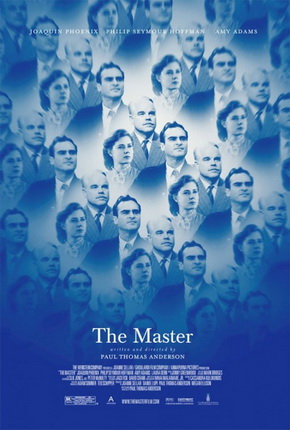 When the smoke clears it really doesn’t matter whether Paul Thomas Anderson’s latest film is about Scientology or not. So much about L. Ron Hubbard’s creation is shrouded by mystery or very strong opinions that it’s an impossible task to accurately document, satirize, or riff on the subject without incurring a myriad of responses that take away from the experience of The Master.
When the smoke clears it really doesn’t matter whether Paul Thomas Anderson’s latest film is about Scientology or not. So much about L. Ron Hubbard’s creation is shrouded by mystery or very strong opinions that it’s an impossible task to accurately document, satirize, or riff on the subject without incurring a myriad of responses that take away from the experience of The Master.
And an experience it is. A difficult, interesting, odd, frustrating, and oftentimes majestic experience. One should expect no less from the filmmaker, one of very few alive today whose simple act of releasing a work constitutes an event film.
Joaquin Phoenix gives a fearless and volatile performance as Freddie Quell. A seaman with short fuse, sexual frustration issues, and a gigantic void in his life, Freddie is ever searching for something. A lost love, an orgasm, a fight, or sometimes just a pure moment of clarity. He storms through moment after moment rarely looking back. He’s on a collision course with failure in almost every way until he stumbles into something too complex to dismiss, in this case admittance into the weird and oddly alluring family bubble of Philip Seymour Hoffman’s author and scientist Lancaster Dodd. In the man he finds a conduit for his broken ideals and unharnessed anger. Part protegee part guinea pig, and part enforcer.
In return Dodd has a challenge. A square peg to try and force into situations. The ultimate test. Aided by Freddie’s noxious and surely dangerous alcoholic potions the two bond and clash through a series of amazing, strange, hilarious, and universally compelling moments. The kind of moments that have helped prove Paul Thomas Anderson to be a major American filmmaker.
After the timeless and extremely focused There Will Be Blood, The Master feels like a purging of sorts. The air has been let out. Where Magnolia was ponderous and fat and Blood was lean and sharp, The Master takes ideas of self and manipulation into interesting crannies in a manner that can only be interpreted as artistic growth and freedom. There are shades of Terence Malick here. Of Kubrick. Except where those filmmakers cater to their own forces Anderson seems to know when to give the audience a treat for coming along for the ride. Almost serving as chapter stops, shots of an impossibly blue sea break the film into segments and seem to snap the hypnotic trance which dovetails nicely with the film’s cultish subject matter.
Phoenix’s gaunt appearance, uncomfortable expressions, horrible posture, and wiry tenacity contrasts perfectly with Hoffman’s elegant and effervescent privileged confidence and where the former’s performance is built on combustion the latter is a multi-layered one where the polish and sheen covers much hurt, fear, and cunning. Both actors feed off Anderson’s words and though the overall film is odd terrain for a mainstream audience to negotiate there’s a curious appeal to it. There’s also a definite joy in seeing the usually repressed Amy Adams playing Dodd’s wife and moral compass and two scenes in particular showcase her ability to easily segue into Anderson’s world. She delivers an eerie and subtle performance, and though she’s fine in the film any moments away from the two leads hurt the momentum. When Hoffman and Phoenix are able to unload, both in very effective interrogation scenes and in a deliciously vulgar jailhouse exchange, they are astounding.
Overall the film does a good job of not making the cult aspect heavy handed or satirical. While any research of Scientology will yield many similarities to the film, Anderson does a good job of not going too far into the loony bin. Part of that is due to the film being set in the 1950’s before time and growth turned the sect into something larger and part is to avoid too many litigious targets, but the end results show how one man can build belief and use a diverse skill set to manipulate and create something in a rather extraordinary manner. There’s a cynical bent to much of the film’s latter half confrontations but The Master ultimately isn’t “The Paul Thomas Anderson Scientology Movie” as much it is another notch in the filmmaker’s belt and another piece of cinema being made in possibly the hardest era for auteurs. It doesn’t linger in the psyche as much as a Boogie Nights or There Will be Blood, but it’s a must see. Difficult. Odd. Unmissable.
Rating: 




Out of a Possible 5 Stars